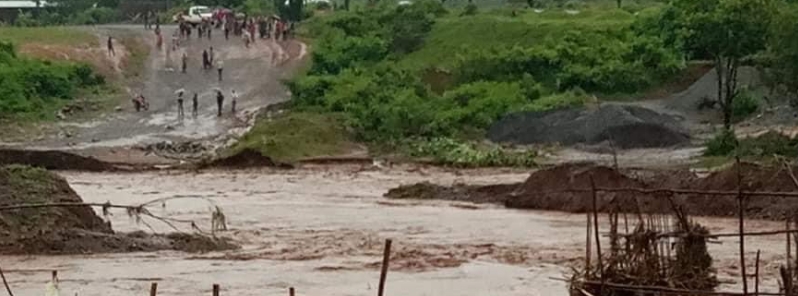Intense rains trigger deadly flash floods in Ethiopia and Somalia, 83 000 displaced

Seasonal rains continued to strengthen in most parts of East Africa during the fourth week of April 2020, leading to a significant increase in rainfall which triggered deadly flash floods in Ethiopia and Somalia. Around 83 000 people have been displaced.
Since April 20, rains have been affecting much of Somalia's states and territories, causing a river to burst which triggered fatal flash floods. Damage and casualties were reported, particularly in the regions of Bay and Bakool.
According to UN OCHA and the Food and Agriculture Organization (FAO), around 81 000 people were displaced and about 55 000 were affected across South West; more than 2 000 displaced and 300 affected in Jubaland; roughly 4 500 impacted in Puntland, and more than 700 across Banadir.
FAO added that compared to the first two weeks, there was a significant increase in rainfall in most parts of Somalia, as well as the eastern Ethiopia highlands. A lot of areas were hit by heavy rains for more than three days consecutively.
The rains replenished pasture resources– milk productions and livestock body conditions improved. However, the downside was flash flooding in parts of the country as the Juba and Shabelle rivers became swollen.
Most of the stations registered 50 to 100 mm (2 – 4 inches) of rainfall from April 24 to 27. In Belet Wayne and surrounding areas, river levels had a sharp increase and are now at 6 m (20 feet). Meanwhile, the water level at Bulo Burti is likely to rapidly increase in the next few days.
In Jowhad, the river level had increased by 1 m (3 feet) in the past 24 hours alone. The water levels are forecast to keep rising along the entire channel of Shabelle as more waters from the Ethiopia highlands stream in.
There is also a high risk of flooding along the Shabelle this week into early May. FAO warned that river breakages may worsen the flooding situation unless prompt measures will be conducted.
#Puntland President Said A Deni has paid a visit to the victims of Tuesday’s downpour in and around Qardho. The President was seen walking through the neighborhoods that were heavily effected by the floods. #Somalia pic.twitter.com/qnL6LmuUIY
— Mohamed Moalimuu (@MOALIMUU) April 28, 2020
WATCH: Flood water has submerged roads in #Qardho town in #Puntland State of #Somalia on Monday night after heavy rainfall. At least 5 people have been killed in the floods according to @somaliguardian. There have been reports of homes swept away by the water. pic.twitter.com/S2nT18WeYN
— HornToday (@HornToday) April 28, 2020
PHOTO NEWS: Deadly floods in Somalia’s Northeastern town of Qardo [Gardo] pic.twitter.com/JRMuAiWVfB
— Mowliid Haji Abdi (@MowliidHaji) April 28, 2020
On April 28, governor of Qhardo town confirmed fatalities and damages after torrential rains struck the area.
"At least 10 people have died after floods wreaked havoc in the town and more than 20 others injured and are now getting treatment in a city hospital," the official stated, adding that the death toll may increase as the extent of the damage is still being investigated.
Residents described the rains as "terrible"– many houses were destroyed and parked cars were swept away. Telecommunications and power have been disrupted.
Heavy rain to locally very heavy rain is forecast over central and north Somalia on April 29.
PICTURES: #Puntland president Said Abdullahi Deni visits #Qardho on Tuesday to meet with locals effected by the worst floods. #Somalia. pic.twitter.com/fi9m3eyVNZ
— Garowe Online (@radiogarowe) April 28, 2020
A heavy floods was stuck last night in Qardho, Puntland, the east of Somalia, killed 3 people and injured 2, while some other persons are still missing, the floods caused displacement and material destructions.@UNSomalia @DKinSomalia @UKinSomalia @US2SOMALIA @TheVillaSomalia pic.twitter.com/5MPLOEn3IY
— Hassan Abdirahman (@HassanAHussen) April 28, 2020
#QARDHO: At least six are dead, 10 others missing after flash floods triggered by heavy Gu’ rains hit the town of Qardho in Somalia’s Puntland region. Floods have also destroyed homes and food stores, some residents have been displaced, officials say.@alihwarsame @M_Farmaajo. pic.twitter.com/LyOcZJivtk
— Axmed Caano Cadeeye (@axmed_caano) April 28, 2020
Pray for the #Qardho! Gu' rains hits Qardho City caused Flash floods, there are at least 3 person death and other destruction of property included Homes, schools and business. Lord help Qardho People and we stand for you. please stand for Qardho.#Qardho #Somalia #Puntland pic.twitter.com/pxCObapfwb
— Abdulkadir Beddal (@Beddal252) April 28, 2020
In Ethiopia, at least four people died while several people were injured after flash floods hit the city of Dire Dawa on April 24. Two of the victims died when their houses collapsed.
Widespread damages to homes and infrastructure were reported, but the full assessment is yet to be completed. The Dachata River, which had been dry, overflowed following the heavy rains.
Areas in the country's southern parts were also affected. The Neri River broke its banks as well, flooding portions of Jinka in Debub Omo Zone of the Southern Nations, Nationalities, and Peoples Region (SNNPR) in the southwest.



Severe weather has been impacting countries in East Africa over the past weeks, including Rwanda, Burundi, Djibouti, the Democratic Republic of Congo, and Kenya.
Featured image credit: @TarekegnTilaye/Twitter

Commenting rules and guidelines
We value the thoughts and opinions of our readers and welcome healthy discussions on our website. In order to maintain a respectful and positive community, we ask that all commenters follow these rules:
We reserve the right to remove any comments that violate these rules. By commenting on our website, you agree to abide by these guidelines. Thank you for helping to create a positive and welcoming environment for all.